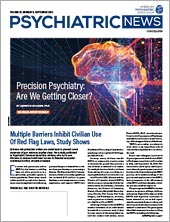APA’s Board of Trustees voted to sign on to an amicus brief by the Association of American Medical Colleges (AAMC) in support of Harvard College and the University of North Carolina in an affirmative action case before the United States Supreme Court. The case is Students for Fair Admissions v. President and Fellows of Harvard/UNC.
The decision by Trustees, after reviewing the AAMC brief, was one of a range of issues they considered at its July meeting in Washington, D.C.
The AAMC brief does not address the particular policies of any university, but instead provides information to the Court regarding the importance of affirmative action in ensuring that medical schools have diverse undergraduate candidates to choose from to fill their classes. The brief furthers the argument by pointing out that diversity in medical schools promotes a wide range of cultural benefits that help physicians better understand the populations they serve.
The Supreme Court will consider the case in its term beginning in October.
“The Board’s carefully considered support of the AAMC’s amicus brief demonstrates APA’s commitment to fostering and sustaining a diverse workforce in psychiatry and medicine to advance the health and well-being of psychiatrists and all whom we serve,” said APA President Rebecca Brendel, M.D., J.D.
The plaintiff in the case, Students for Fair Admissions, alleges that Harvard University/UNC discriminated against Asian Americans and is seeking to prevent colleges and universities from using race as part of their holistic review of applicants. In November 2020, the U.S. Court of Appeals for the First Circuit upheld a lower court’s ruling in 2019 that Harvard does not discriminate against Asian Americans when its undergraduate college uses race and ethnicity as factors in reviewing applicants, according to an article in the February 25, 2021, Washington Post.
APA CEO and Medical Director Saul Levin, M.D., M.P.A., said support of the AAMC in the case is in keeping with APA’s policy of seeking to increase the diversity of undergraduate students entering the medical school “pipeline.”
“Research supports that social and cultural factors play a major role in health outcomes,” Levin said. “When there is racial concordance between patient and physician, patients report higher levels of trust and satisfaction. Therefore, ensuring a pipeline of diverse candidates from college to medical school and from medical school through residency is an important part of training psychiatrists who are respectful and knowledgeable and demonstrate cultural sensitivity with the patients they serve.”
Building a Roadmap for the Future
Brendel began the first meeting of the 2022-2023 APA Board of Trustees with a team-building exercise to set the stage for the Board’s work over the next year, with an emphasis on openness to new ideas, turning challenges into opportunities, and creating opportunities for the next generation of psychiatrists. Her presidential theme is “A Roadmap for the Future.”
She invited Robert Trestman, M.D., Ph.D., chair of the APA Council on Healthcare Systems and Financing, to discuss with the Board issues of access, equity, and professional identity and how to ensure psychiatry takes a leadership role in expanding access to quality care (see box). Charles Dike, M.D., M.P.H., chair of APA’s Ethics Committee, shared his thoughts on the ethical and professional responsibilities of psychiatrists in the future.
“The current mental health pandemic is a time of both challenge and opportunity,” Brendel said. “The goal of the Board’s work on our Roadmap for the Future is to envision where psychiatry and APA need to be in the coming decades to advance our profession, be prepared, and lead the way for high-quality, evidence-based mental health care for all Americans.”
Other Business
The Board approved the creation of three new caucuses: the Caucus on Social Determinants of Mental Health under the Council on Minority Mental Health and Health Disparities; the Caucus on Pain Management under the Council on Consultation-Liaison Psychiatry; and the Caucus on Neuromodulation under the Council on Research.
Trustees approved six new or revised position statements. These include:
